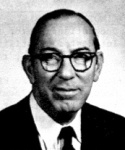Henry Chadwick Award: John C. Tattersall
This article was written by John Thorn
This article was published in Spring 2014 Baseball Research Journal
 John C. Tattersall (1910–81) was a great authority on home runs and early baseball records. His scrapbooks of multiple box scores for nearly every game from 1876 to 1890 proved vital for three generations of baseball encyclopedia: Turkin–Thompson in 1951, ICI/Macmillan in 1969 (for which he was listed as “Consulting Editor”), and Total Baseball in 1989. Tattersall’s day-by-day records have been lost, but what has survived is a batting and fielding summary and a pitching summary for each club in each year.
John C. Tattersall (1910–81) was a great authority on home runs and early baseball records. His scrapbooks of multiple box scores for nearly every game from 1876 to 1890 proved vital for three generations of baseball encyclopedia: Turkin–Thompson in 1951, ICI/Macmillan in 1969 (for which he was listed as “Consulting Editor”), and Total Baseball in 1989. Tattersall’s day-by-day records have been lost, but what has survived is a batting and fielding summary and a pitching summary for each club in each year.
Tattersall first gained national attention for his baseball research in 1953 when The Sporting News ran his story on the correction of Nap Lajoie’s 1901 batting average from .405 to .422. (In that same year he self-published Home Run Parade, “a complete exposition of the home run production of all active major league baseball players.”) Lajoie had originally been credited with a .422 average, with 220 hits in 543 at bats. After a number of years, someone noticed that if you take these at bats and hits, the average comes out only to .405, so his average was changed. Turkin–Thompson gave Nap a mark of .409 in its first edition, in 1951. Later in the 1950s, Tattersall had his doubts and decided to go through his newspaper collection of box scores. He found 229 hits for Lajoie, not 220—the error had been in the figure for hits, not in the figure for batting average. Thus his average was restored to .422, which happened to be the highest in American League history. ICI/Macmillan research in this area came up with a .426 mark (232 for 544, based on newspaper accounts), which was his average as published in the 1969 Baseball Encyclopedia.
Tattersall also found disputed hits in Anson’s record for 1879; he compiled pinch-hit, Hit by Pitcher, and Batters Facing Pitcher records where none had existed before, and established the home run log, which SABR purchased and maintains. The home run log was digitized and has been licensed for use by BaseballReference.com.
Tattersall was born in Holyoke, Massachusetts, in 1910. He attended Georgetown University’s School of Foreign Service in Washington, DC, receiving a BS in 1933 and a Masters the next year.
His interest in baseball had been stimulated by visits to Ponce de Leon Park in Atlanta to see the Crackers play in 1922–23. He saw his first major league game in Boston on June 16, 1926, and remembered Pirates pitcher Vic Aldridge stealing one of only two bases in his career. His interest in home runs developed from watching the Yankees and Babe Ruth, his particular favorite. He became fascinated by statistical research and stole time from his studies at Georgetown to do baseball research at the Library of Congress.
He went to work in the shipbuilding industry in 1935 in New York, later moving to Boston and then Philadelphia (with time out for work with the War Shipbuilding Administration in WWII). In Boston in 1941 he purchased from the Boston Transcript, which was going out of business, a large number of baseball scrapbooks and sports pages dating back to 1876 when the National League was founded with Boston as a charter member. He soon found himself in possession of a very large amount of material which, after years of cataloging and filing, gave him almost every box score in major league history.
After joining SABR in 1971, shortly after it was formed, Tattersall began organizing his home run material for publication. He supplied several interesting articles for the Baseball Research Journal and in 1975 published on his own Home Run Handbook, now scarce. The following year he published The First Season, a centennial reproduction by photocopy of all the box scores of the NL in its initial season of 1876. In 1977 he reconstructed The Early World Series, 1884–1890.
It was in 1977 that he retired as vice president of his shipbuilding company in Philadelphia and moved to Del Ray Beach, Florida. He passed away in Boca Raton on May 29, 1981.
For more information on the Henry Chadwick Award, click here.


